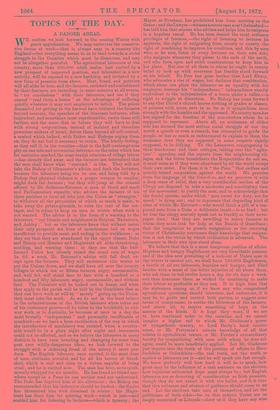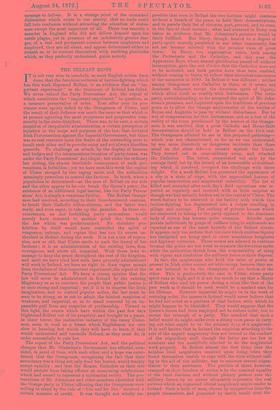TOPICS OF THE DAY.
A DANGER AHEAD.
WE confess we look forward to the coming Winter with grave apprehension. We may underrate the conserva- tive forces at work—that is always easy in a country like England—but everything seems to us to tend towards a social struggle in the Counties which must be disastrous, and may not be altogether peaceful. The agricultural labourers of the country, more than 600,000 adult males, just excited by a new prospect of improved position, and interested in a new activity, will be exposed to a new hardship, and irritated by a new form of pressure from above. Meat, bread, and potatoes will all alike be dear, and the farmers, enriched and emboldened by their dearness, are intending, in some counties at all events, to "try conclusions" with their labourers, and see if they cannot "read them a lesson" on the advantages of suffering quietly whatever it may suit employers to inflict. The prices demanded for getting in the harvest have irritated the farmers beyond measure, the speeches of the itinerant lecturers, often imprudent, and sometimes most reprehensible, excite them still further, and the sense that in future they will have to deal with strong corporations, instead of isolated and therefore powerless seekers of bread, drives them beyond all self-control, a control which indeed, with Dukes and Bishops urging them on, they do not feel it necessary to retain. The kindly feeling, as they call it, in the counties—that is the half-contemptuous pity on one side and reverential deference on the other which has for centuries marked the semi-feudal relations of village labour —has already died away, and the farmers are determined that the men shall know what " contract " is like. They will not take the Bishop of Gloucester's advice, and duck the lecturers, because the labourers being ten to one, and being told by a Bishop that physical violence is a proper weapon to employ, might duck the farmers ; but they will jump at the counsel offered by Mr. Sotheron-Estcourt, a man of blood and mark and Parliamentary capacity, who advises the farmers of his three parishes to treat all who join the Union as "strangers," to withdraw all the perquisites of which so much is made, to take away the potato-grounds, to raise the rent of the cot- tages, and to refuse to keep on men in winter when work is not wanted. The advice is in the form of a warning to the labourers, "my friends and neighbours in Shipton, Newntown, and Ashley ;" but as the labourers know that without union their only prospects are lives of monotonous toil on wages insufficient to provide meat, and ending in the workhouse ; as they see that they are abandoned by the upper classes, Duke and Bishop and Member and Magistrate all alike threatening, scolding, and warning them ; as they see that the half- formed Union has already raised the usual rate of wages is. 6d. a week, Mr. Estcourt's advice will fall dead, ex- cept upon the farmers. They will endeavour this winter to put the Unions down, and we shall have all over the country villages in which ten or fifteen farmers, angry, unreasonable, and well fed, will stand face to face with a hundred or a hundred and fifty, labourers, angry, unreasonable, and without food. The Unionists will be locked out in heaps, and when they apply to the parish will be told by the Guardians that as they can have work at will by " merely " giving up the Union, they must take the work. As we do not in the least believe in the submissiveness of the British labourer when taken out of his customary groove—if he takes to the brickfield, to rail- way work, or to Australia, he becomes at once in a day the most brutally "independent" and personally insufferable of mankind—as we have a keen recollection of the way in which the introduction of machinery was resisted, when a country- side would be in a glare night after night and insurances could not be effected, and as we believe the labourers in many districts to have been brooding and champing for some time past over wildly-dangerous ideas, we look forward to the struggle with a sickening dread of the misery it must pro- duce. The English labourer, once excited, is the most dour of men, obstinate, scornful, and for all his horror of blood- shed, which is real and rises to a virtue, capable of being cruel; and he is excited now. The man has been, so to speak, morally whipped for six months. He has found no friend any- where except in a Press he can neither read nor understand. The Duke has deprived him of his allotment ; the Bishop has recommended that his instructor should be ducked ; the Squire has threatened him with dismissal in winter ; the Magis- trate has fined him for quitting work—which is just—and scolded him for listening to lectures—which is tyranny ; the
Mayor, at Evesham, has prohibited him from meeting on the Green; and the Lawyer—witness a recent case near Chelmsford— has told him that anyone who advises and helps him to emigrate is a hopeless rascal. He has been denied the most ordinary privileges of freemen,—the right of listening to lectures he approves, the right of emigrating from county to county, the-
right of combining to improve his condition, and this by mem who, as he sees, listen to every lecturer on their own side,. who emigrate whenever they please to the ends of the earth, and who form open and strict combinations to keep him in his place. Not one of all those to whom he ought in county belief to look up with reverence has frankly stood forward on his behalf. No Peer has gone farther than Lord Ebury, who advocates a rise of wages, but declares that combination,. which alone can place the labourer on an equality with his. employer, destroys his "independence," independence exactly equivalent to the independence of a worm under a roller,—a. right to wriggle at discretion. No Bishop has come forward to say that Christ's church knows nothing of grades or classes,. or persona with acres, save in so far as it sympathises most strongly with the humble and the oppressed. No county member has argued for the freedom of the non-electors whom he is supposedto represent. Above all, no statesman of either side' has deemed the most serious social struggle of our day worth a speech or even a remark, has attempted to guide the people, or has so much as endeavoured to explain to them the- economic laws they are supposed, in some respects rightly supposed, to be defying. To the Labourers, congregating in their beerhouses and their cottages, talking over the " agita- tors' " speeches, and the reports from the neighbouring vil- lages, and the bitter broadsheets the Respectables do not see, it must seem as if they were abandoned by all the world except their own order. For them it is "the Poor," that endless and strictly-bound corporation, against the world. We perceive- from the language of the Guardian, and we perceive it with, a deep sense of relief, that a very considerable section of the Clergy are disposed to take a moderate and conciliatory view of the movement ; to justify the men, and to acknowledge that the feudal system, under which "men sweat for duty, not for meed," is dying out ; and to deprecate that degrading kind of alms of which Mr. Estcourt—who would think a gift of a ten- pound note from a Duke a deliberate insult—is so fond ; but we fear the clergy scarcely speak out as frankly as their news- paper does ; that they are unwilling to annoy farmers to whom they must look for help at the Boards of Guardians ; that the temptation to preach resignation as the crowning virtue of Christianity overcomes their knowledge that resigna- tion is not the virtue by which civilisation is advanced. The labourers in their own eyes stand alone.
We believe that this is a most dangerous position of affairs.- Hopeless and hungry Englishmen are very formidable persons, and if the idea now prevailing of a lock-out of Union men in. the winter is carried out, we shall have 150,000 Englishmen, a fourth of all our labourers, hopeless and hungry, and filled besides with a sense of the bitter injustice of all above them,. who ask them to toil twelve hours a day for six days a week, and then denounce them as wicked for combining to make their labour as profitable as they can. It is high time that the statesmen among us, if we have any who comprehend agricultural questions, should intervene, and endeavour, if it may be, to guide and control both parties, to suggest some terms of compromise, to soothe the bitterness of the farmers, and above all, to inspire something of hope in the masses of the hinds. It is hope they want, if we are to have continued order in the counties, and we cannot imagine a higher end to which Mr. Gladstone's power of sympathetic oratory, or Lord Derby's hard incisive sense, or Mr. Fortescue's minute knowledge of all that relates to agricultural tenure, or Mr. Forster's extraordinary faculty for sympathising with men with whom he does not agree, could be more beneficially applied. Let Mr. Gladstone just inquire into the truth of the position of affairs in Here- fordshire or Oxfordshire—the real truth, not the truth as squires or labourers see it—and he will speak out fast enough,. We know perfectly well how hard it will be to speak, how great may be the influence of a rash sentence on the electors, how injurious unfounded hope must always be ; but English labourers are as deserving of consideration as Irish peasants, though they do not extort it with the bullet, and it is time that this reticence and absence of guidance should come to an. end. Let the elections take care of themselves, and let the politicians of both sides—for on this subject Tories are as deeply concerned as Liberals—show us if they have any wise message to deliver. It is a strange proof of the unmarked possible that even in Belfast the two factions might continue dislocation which exists in our society, that no trade could without a breach of the peace, to hold their demonstrations, fall into confusion without attracting the attention of states- and to parade their list of victories, past, present, and to come, men except the most important of all. There was scarcely a in the face of their enemies ; what had occurred in Derry was member in England who did not deliver himself upon the taken as evidence that Mr. Johnstone's promises would be cattle plague, yet in presence of an indefinitely greater dan- fairly fulfilled. But Derry, though heated to a degree of ger, of a real and permanent scission between employers and party-spirit scarcely paralleled in any other community, has employed, they are all silent, and appear determined either to not yet become infected with the peculiar vices of great remain so, or to content themselves with soothing platitudes towns. In Derry, too, organisation exists, both among



































 Previous page
Previous page